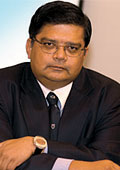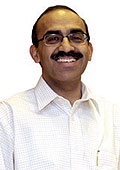 |
 |
 |
| (From left
to right) Adlabs' Shetty, iFlex's Hukku & CRISIL's Mohan:
They continue to play key roles in their companies |
Entrepreneur Clyde Cooper
today does not own a single share in Blue Dart Express, which
he had set up with co-founders Khushro Dubash and Tushar Jani
in the mid-80s. Cooper lost the promoter tag after the co-founders
sold out to dhl Express in 2004. The latter now holds 81.03 per
cent in the company, but has retained Cooper as a Director. He
continues to play a key role in shaping the company's business
in India.
Ditto for professional managers like Rajesh Hukku and Deepak
Ghaisas of i-flex Solutions. Oracle bought up the company in August
2005, but retained Hukku and Ghaisas in their positions of Chairman
and CEO (India), respectively.
There are many such examples where a change of control hasn't
resulted in a change of management. And examples include both
professional managers and former promoters. Manmohan Shetty of
Adlabs (now part of R-ADAG) and Hemendra Kothari of DSP Merrill
Lynch (now owned by the us principal), who nursed their respective
companies from inception, continue to play important, even pivotal,
roles in the new set-ups. Ravi Mohan, Managing Director, CRISIL,
and Anil Singhvi, Managing Director, Gujarat Ambuja Cement, are
two more members of this growing tribe.
What is it to work in one's old position but under a new owner?
Well, for one, it involves reworking one's priorities and processes
in line with the thinking of the new masters.
 |
| Gujarat Ambuja's Singhvi |
"Adlabs has become a lot more aggressive," says Shetty,
who retained his position as Managing Director after Anil Ambani
bought his company. Once entrepreneur, Shetty retains a minority
18.32 per cent stake in Adlabs, but still calls the shots like
he did earlier. "We used to face financial constraints earlier,
but not anymore," adds Shetty, whose former co-promoter Vasanji
Mamania exited from the business in 2006 after offloading his
entire 31.51 per cent equity to Ambani, who now holds a majority
54.91 per cent equity in the company.
Standard & Poor's, which bought a majority 55.08 per cent
stake in rating agency CRISIL in February 2005, has also retained
Ravi Mohan, who was Managing Director under the previous set-up,
in the same position. "We are now part of S&P's global
network. This not only opens up global opportunities for us, but
also improves our own rating systems and management processes,"
he says.
Anil Singhvi, Managing Director, Gujarat Ambuja Cement, who
retained his position when the company was taken over by Swiss
major Holcim, is driving the transition at this former family-run
company. "We are transforming from an entrepreneur-run company
to a people-driven company."
-Anand Adhikari
Media,
Entertainment Sector is on Steroids
 The
Indian media and entertainment sector is surpassing projections.
Last year, the FICCI-PWC (PricewaterhouseCoopers) report on the
sector had projected a size of Rs 45,000 crore by 2009; this year's
report, titled "The Indian Entertainment & Media industry:
The Growth Story Unfolds", unveiled at the 2007 ficci Frames
conference, the seventh such, held in Mumbai on March 26-March
28, says the industry clocked revenues of Rs 43,000 crore in 2006,
and so, is set to exceed the 2009 projections by a fair margin.
The industry is now expected to grow to Rs 1 lakh crore by 2011,
a cumulative annual growth rate (CAGR) of 18 per cent. The biggest
contributors to this steroid-charged growth: television, followed
by films, in that order. "One of the key reasons for the
high projected growth is the fact that the entertainment and media
industry is cyclical in nature and grows faster when the economy
is expanding," says Timmy S. Kandhari, Executive Director
and Leader (Entertainment and Media Practice), PWC. The
Indian media and entertainment sector is surpassing projections.
Last year, the FICCI-PWC (PricewaterhouseCoopers) report on the
sector had projected a size of Rs 45,000 crore by 2009; this year's
report, titled "The Indian Entertainment & Media industry:
The Growth Story Unfolds", unveiled at the 2007 ficci Frames
conference, the seventh such, held in Mumbai on March 26-March
28, says the industry clocked revenues of Rs 43,000 crore in 2006,
and so, is set to exceed the 2009 projections by a fair margin.
The industry is now expected to grow to Rs 1 lakh crore by 2011,
a cumulative annual growth rate (CAGR) of 18 per cent. The biggest
contributors to this steroid-charged growth: television, followed
by films, in that order. "One of the key reasons for the
high projected growth is the fact that the entertainment and media
industry is cyclical in nature and grows faster when the economy
is expanding," says Timmy S. Kandhari, Executive Director
and Leader (Entertainment and Media Practice), PWC.
Last year's focus on technology and digitisation of entertainment
continued and is expected to remain the mantra for the Indian
entertainment industry for the next five years. Another theme
that seemed to pervade the convention was that too much regulation
would be an overkill for this growing sector.
NUMBERS THAT ENTERTAIN
The Indian media and entertainment industry
is growing at breakneck speed. |
»
Internet advertising industry is set to post the
highest CAGR of 43 per cent; grow from its current size of
Rs 160 crore to Rs 950 crore in 2010
» The
television industry is projected to grow at a CAGR of 22 per
cent from Rs 19,100 crore now to Rs 51,900 crore by 2011
» The
film industry will grow at a CAGR of 16 per cent from Rs 8,500
crore now to Rs 17,500 crore by 2011
» Print
media to grow 13 per cent annually from Rs 12,800 crore to
Rs 23,200 crore during this period
» Radio
to grow 28 per cent per annum from Rs 500 crore to Rs 1,700
crore
» Music
industry to expand at a CAGR of 4 per cent from Rs 720 crore
to Rs 870 crore
» Live
entertainment to grow 16 per cent p.a. from Rs 900 crore to
Rs 1,900 crore
» Out-of-Home
advertising to grow 17 per cent p.a. from Rs 1,000 crore to
Rs 2,150 crore
Source: FICCI-PwC |
The three-day FICCI Frames Convention, Asia's biggest global
convention on entertainment, had 1,975 delegates and 250 speakers
from 20 countries attending its 35 sessions.
-Anusha Subramanian
IT's
Raining Advisors in India
 |
| On the growth path: Pai |
A decade ago, Avinash Vashistha
relocated to India and helped telecom equipment major Nortel expand
its Indian R&D centre from 250 people to 2,000 in three years.
Then, rather than move to another MNC and set up its India ops,
Vashistha started his own venture, NEOIT, in 1999 to provide advisory
services to the then fledgling it services market. Eight years
on, India's market has grown to over $30 billion (Rs 1,32,000
crore) and Vashistha has moved on to his second enterprise, Tholons.
"There's tremendous interest in India; At least $6.5 billion
(Rs 28,600 crore) will be invested in the IT and BPO market this
year," he explains.
TPI is, perhaps, the best known name in this business. "I
set up the India operations alone and we now have 20 advisors
and are growing," says Sid Pai, Partner at TPI, who is part
of a global network of consultants that advises on deals worth
$25-$30 billion (Rs 1,10,000-1,32,000 crore) annually. And several
other players, such as pa Consulting, Zinnov Consulting and Alsbridge,
have all followed this trend and set up offices in India.
-Rahul Sachitanand
|









 The
Indian media and entertainment sector is surpassing projections.
Last year, the FICCI-PWC (PricewaterhouseCoopers) report on the
sector had projected a size of Rs 45,000 crore by 2009; this year's
report, titled "The Indian Entertainment & Media industry:
The Growth Story Unfolds", unveiled at the 2007 ficci Frames
conference, the seventh such, held in Mumbai on March 26-March
28, says the industry clocked revenues of Rs 43,000 crore in 2006,
and so, is set to exceed the 2009 projections by a fair margin.
The industry is now expected to grow to Rs 1 lakh crore by 2011,
a cumulative annual growth rate (CAGR) of 18 per cent. The biggest
contributors to this steroid-charged growth: television, followed
by films, in that order. "One of the key reasons for the
high projected growth is the fact that the entertainment and media
industry is cyclical in nature and grows faster when the economy
is expanding," says Timmy S. Kandhari, Executive Director
and Leader (Entertainment and Media Practice), PWC.
The
Indian media and entertainment sector is surpassing projections.
Last year, the FICCI-PWC (PricewaterhouseCoopers) report on the
sector had projected a size of Rs 45,000 crore by 2009; this year's
report, titled "The Indian Entertainment & Media industry:
The Growth Story Unfolds", unveiled at the 2007 ficci Frames
conference, the seventh such, held in Mumbai on March 26-March
28, says the industry clocked revenues of Rs 43,000 crore in 2006,
and so, is set to exceed the 2009 projections by a fair margin.
The industry is now expected to grow to Rs 1 lakh crore by 2011,
a cumulative annual growth rate (CAGR) of 18 per cent. The biggest
contributors to this steroid-charged growth: television, followed
by films, in that order. "One of the key reasons for the
high projected growth is the fact that the entertainment and media
industry is cyclical in nature and grows faster when the economy
is expanding," says Timmy S. Kandhari, Executive Director
and Leader (Entertainment and Media Practice), PWC.